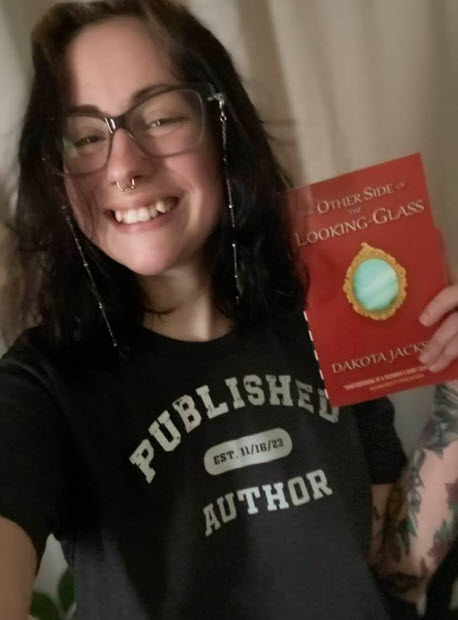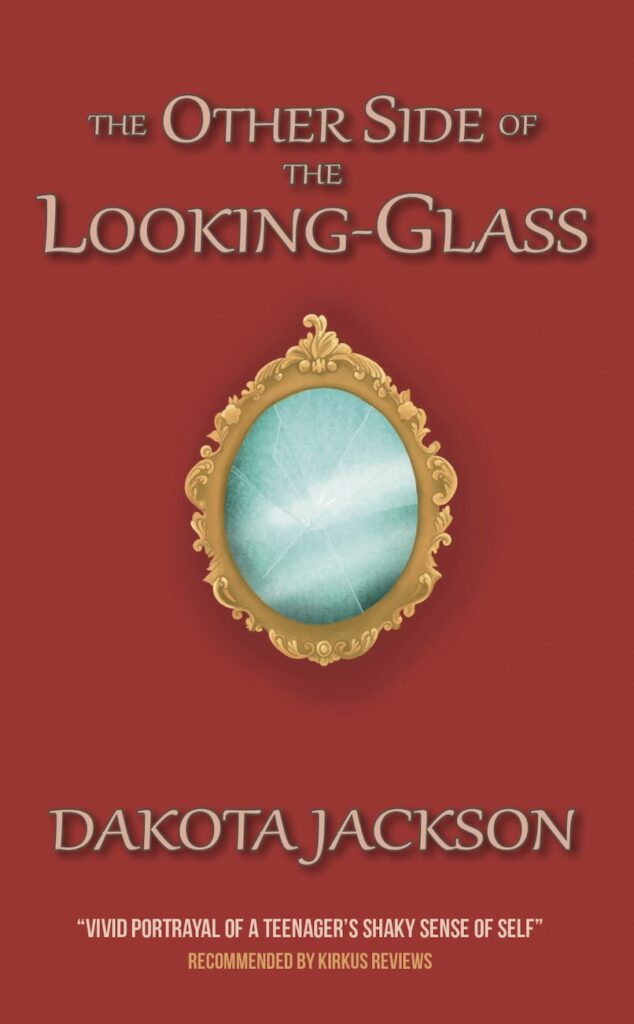

- What inspired the idea for your book?
It’s hard to say that any one thing inspired The Other Side of the Looking-Glass. The idea came to me late one night when the very first line in the book, “Wren Blackwell liked it when I cried,” simply popped into my head (without his full name quite sorted yet, but same idea!) Around that time, I had been seeing a lot of talk on social media about some stories where teenagers were romantically involved with adults and it kept rubbing me the wrong way how many people didn’t see the problem with it. In many ways, this book was built around my desire to do the opposite. I wanted to represent the toxic underbelly of those sorts of relationships at the same time I explored how they have been ‘normalized’ in a lot of instances. It was also a place for me to channel my own experiences as a young girl both in relation to how society viewed me and how I was trying to find a solid way to view myself. The intricacies of the plot and characters all kinda fell into place around these themes with time.
- How did you come up with the title for your book?
A major aspect of The Other Side of the Looking-Glass is the drama club at the high school my main character Naomi attends. Her guardian, Matt, is the teacher there and this serves as a place where a lot of symbolism and important conflicts either start or end. The play the drama club puts on is Alice in Wonderland. I used Lewis Carroll’s work overall as a bit of an allegory for Naomi’s arc, so I always wanted the title to reflect that somehow. Originally I wrote it as Through the Tinted Glass as a way of representing that something was being concealed beyond the surface, but after speaking with my publisher, we decided to shift to The Other Side of the Looking-Glass which was a bit more straightforward. We probably went through a dozen different tiles before landing there.
- How long did it take you to write this book?
I wrote this novel in roughly three months. Once the idea came to me, the rest just flowed out. I didn’t even have an outline; I just sat down every night and wrote on the spot. I felt really connected to the characters and invested in their relationships which allowed me to keep going until it was done. The turnaround time is one I haven’t matched since.
- If you were to write a spin-off about a side character, which would you pick?
I’ve been asked before if I would ever write a sequel or spin-off to The Other Side of the Looking-Glass, and the honest answer is absolutely not, but if I had to, I’d pick Naomi’s guardian Matt. I would choose to write about his upbringing, especially since it is interconnected with Naomi’s birth parents, and elaborate on the storyline of his past that’s only briefly touched upon in this novel.
- When did you write your first book and how old were you?
Probably eight??? The first book I ever attempted to write was with my best friend in elementary school. I can’t remember much about it anymore, but I remember climbing out her bedroom window ‘for research’ because our story was about gremlins hunting us down or something like that.
- What comes first for you — the plot or the characters — and why?
Always the characters. I am a very voice-driven and character-driven writer, so they always come to me first. I’ll have random bits of dialogue or random relationship dynamics pop into my head and I know I have to build something around them. Sometimes I do find myself struggling with plot due to that, though. The first few stories I wrote were genre novels—horror and a psychological thriller, actually—but even then the characters were at the center of everything. I realized after that that I was probably better suited to contemporary fiction and literary fiction. I’d still like to revisit the other genres, though, even with the characters leading the charge. I know it can be done; I just need some more practice.
- Are there therapeutic benefits to modeling a character after someone you know?
I think so! I tend to take inspiration for characters from everywhere: myself, people close to me, people I’ve seen or met once, people in news stories, characters in other media, etc, etc. Whenever I am using real people I know—including myself—to inspire a character’s initial personality and development, I find it cathartic. There’s a lot of room to give these characters better circumstances, better decisions, better relationships, and so on. It feels a bit like offering an alternative reality for ourselves. Escapism at its finest. It’s helped me make sense of a lot of my own emotions and growth as a person, as well. I have a lot of love for my characters.
- Do you play music while you write — and, if so, what’s your favorite?
Almost always. I create playlists for every story I write, and sometimes even for specific characters within those stories. Then I’ll shuffle the appropriate one when I write. If I haven’t generated a playlist yet, I’ll simply shuffle my whole library. Some of my favorite artists to write to are Hozier, Daughter, Ateez and anything that can be considered ‘divorced dad rock.’ 😅
- What do you think is the best way to improve writing skills?
Reading a lot and writing a lot. When I first started being serious about writing, I read this quote from Stephen King: “If you want to be a writer, you must do two things above all others: read a lot and write a lot. There’s no way around these two things that I’m aware of, no shortcut.” It’s stuck with me ever since. Reading and writing are intimately connected. Learn from the work of others in order to improve yourself. I promise it works.
- What is the most valuable piece of advice you’ve been given about writing?
For me personally: “Trust your readers.”
I have a tendency when writing first drafts to over explain or over elaborate in an attempt to really drive home how my characters are feeling. As part of my MFA thesis, I wrote and revised an upmarket contemporary fiction novel with my thesis professor. Almost every bit of feedback she gave me circled back to this problem. The content in the novel is super heavy and sensitive at times, and I wanted to make sure this point got across, but it ended up being too heavy-handed. Once I heard to trust my readers, I cut a lot of extra exposition and realized my story was only stronger because of it. I think about that all the time now when I write.
Social links
Website: https://dakotajacksonbooks.wordpress.com/
Amazon: https://www.amazon.com/stores/Dakota-Jackson/author/B0CGJK32CW
Twitter: @DakotaELJackson
TikTok: @d.e.jackson_
Instagram: @d.e.jackson_